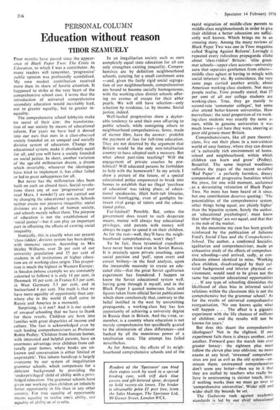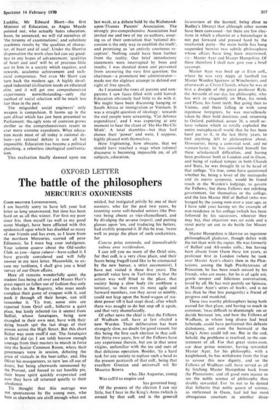PERSONAL COLUMN
Education without reason
TIBOR SZAMUELY
Four months have passed since the appear- ance of Black Paper Two: The Crisis in Education, to which I was a contributor. As
many readers will remember, 'progressive' public opinion was profoundly scandalised.
My own modest contribution received more than its share of hostile attention. It happened to strike at the very heart of the comprehensive school case. I wrote that the introduction of universal comprehensive secondary education would inevitably lead, not td greater equality, but to greater in- equality.
The comprehensive school lobbyists make no secret of their aim: the transforma- tion of our society by means of educational reform. For years we have had it dinned into our ears that ours in a class-obsessed society founded on an unequal and socially divisive system of education. Change the educational system, make it absolutely equal for all, and you will have a society founded on social justice. In short, another variation of the age-old millenarian dream, a dream which invariably, whenever the ideologues hive tried to implement it, has either failed or led to great unhappiness for all.
But never has the millenarian idea been built on such an absurd basis. Social revolu- tions (have any of our 'progressives' ever read Marx, I wonder?) are not carried out by changing the educational system. Schools neither create nor preserve inequality; social
divisions are a product of human society, and schools merely reflect them. The purpose
of education is not the establishment of 'social justice'—but it can play an important part in offsetting the effects of existing social inequality.
Ironically, this is exactly what our present 'class-ridden', divisive system has been doing, with immense success. According to Mrs Shirley Williams, over 26 per cent of our university population and 35 per cent of students in all institutions of higher educa- tion are of working-class origin. This propor- tion is much the highest in Western Europe: in Sweden (whose example we are constantly exhorted to follow) it is only 14 per cent, in Denmark 10 per cent, in France 8.3 per cent, in West Germany 5.3 per cent, and in Switzerland 4 per cent. The truth is that we have more equality of opportunity than any- where else in the world (I shall come to Russia and America in a moment).
Surprising, is it not? And it is our system of unequal schooling that we have to thank for these results. Children are born into
families with great disparities of income and culture. The fact is acknowledged even by such leading comprehensivisers as Professor Robin Pedley: 'Children from literate homes, with interested and helpful parents, have an enormous advantage over children from cul- turally poor homes, where books are un- known and conversation is either limited or unprintable'. This inborn handicap is largely overcome by our system of inegalitarian
grammar schools, which compensate for a deficient background by providing the 'underprivileged' child of ability with a privi- 'edged education. The grammar schools have given our working-class children an infinitely better opportunity in life than in any other country. For true equality of opportunity means equality to realise one's ability, not equality of ability or of results.
In an inegalitarian society such as ours completely equal state education for all can only strengthen existing inequality. Compre- hensives are by definition neighbourhood schools, catering for a small catchment area —and, given the fairly rigid social segrega- tion of our neighbourhoods, comprehensives are bound to become socially homogeneous, with the working-class district schools offer- ing no avenue of escape for their abler pupils. We will still have selection—only selection by residence, i.e. by income. Social justice, indeed.
Well-heeled progressives show a deplor- able tendency to send their own offspring to public schools, while consigning others to neighbourhood comprehensives. Some, made of sterner fibre, have the answer: prohibit the payment of fees for full-time education. They are not deterred by the argument that Britain would be the only non-totalitarian country to have adopted such a measure. But what about part-time teaching? Will the engagement of private coaches be pro- hibited? Will educated parents be forbidden to help with the homework? In my article I drew a picture of the future, of a special educational police empowered to break into homes to establish that no illegal 'purchase of education' was taking place, of educa- tional speakeasies, illicit bath-tub libraries, tutorial bootlegging, even of gunfights be- tween rival gangs of tutors and the educa- tional police.
Far-fetched? Possibly. But, unless the government does resort to such desperate means, money will always buy educational privileges, and parents with money will always be eager to spend it on their children. As for the rest—well, they'll have the neigh- bourhood comprehensives, won't they?
To be fair, these tyrannical expedients have never been tried even in Soviet Russia. It is precisely upon private coaching, upon social position and 'pull', upon overt and covert bribery—in the final analysis, upon the inexorable necessity to create an edu- cated elite—that the great Soviet egalitarian experiment has foundered. I happen to know the Soviet educational system well, having gone through it myself, and in the Black Paper I quoted numerous facts and figures taken from official Soviet publications which show conclusively that, contrary to the belief instilled in the west by unremitting propaganda, a working-class boy has less opportunity of achieving a university degree in Russia than in Britain. And the USSR, re- member, is a country where education is not merely comprehensive but specifically geared to the eliminatidn of class differences—and backed by all the monstrous power of a totalitarian state. The attempt has failed nevertheless.
As for America, the effects of its neigh- bourhood comprehensive schools and of the
rapid migration of middle-class parents to middle-class neighbourhoods in order to give their children a better education are suffici- ently well known. Which brings me to an amusing story. Among the many reviews of Black Paper Two was one in Time magazine called 'Raging Against Reform'. Lovingly it
repeated every ridiculous propaganda cliché about 'class-ridden' Britain: 'elite gram- mar schools—upper-class accents—university aura that separates gentlemen from others— middle class aghast at having to mingle with social inferiors' etc. By coincidence, the very
same page carried another article, about American working-class students. Not many people realise, Time proudly stated, that 37
per cent of all our college students are working-class. True, they go mainly to second-rate 'commuter colleges', but some also attend better-known universities. How marvellous: the total proportion of us work- ing-class students was exactly the same as ours, while in genuine universities it was much lower—yet here they were, sneering at poor old grouse-moor Britain.
Comprehensivisers, like all pure theoreti- cians, live out their plans in a, non-existent world of cosy fantasy, where they can dream of 'a culturally rich environment of home, school and neighbourhood, within which children can learn and grow' (Pedley).
Beautiful. The same inspired woolliness suffuses the pages of the recent so-called 'Red Paper': a perfectly harmless, dreary compendium of progressive banalities which the press, for one wild moment, acclaimed as a devastating refutation of Black Paper Two. No more has been heard of it since, but one contribution deserves quoting: 'The potentialities of the comprehensive system, other things being equal, are plainly higher' than the bipartite system. Surely the author,
an 'educational psychologist', must know that 'other things' are not equal, and that that is the nub of the matter.
In the meantime my case has been greatly reinforced by the publication of Julienne
Ford's Social Class and the Comprehensive
School. The author, a confirmed Socialist, egalitarian and comprehensiviser, made an
exhaustive study of the effects of comprehen- sive schooling—and arrived, sadly, at con- clusions almost identical to mine. 'Working class children, disadVantaged by their cul- tural background and inferior physical en- vironment, would need to be given not the same but superior educational opportunities . . . If any type of schooling diminishes the likelihood of class bias in informal social relations within the classroom this is not the comprehensive but the grammar school.' As for the results of universal comprehensive reorganisation, 'No one knows quite what will happen . . . The effect is a gigantic experiment with the life chances of millions of children; and the results will not be known for years.
But does this daunt the comprehensive ideologues? Not in the slightest. If one experiment fails there is always another, and another. Forward goes the march into ever greater lunacy: the eighteen plus must follow the eleven plus into oblivion; no more exams at any level; 'streamed' comprehen- sives are just as evil as the old system—un- stream them; unstreamed comprehensives don't seem any better—then see to it that they are staffed by teachers who really be- lieve in unstreaming (a sinister touch, this): if nothing works then we must go over to 'comprehensive universities'. Wider still and wider shall thy bounds be set. The Gadarene rush against academic standards is led by our chief educational Luddite, Mr Edward Short—the first Minister of Education, as Angus Maude pointed out, who actually hates education. Soon, he anounced, we will rid ourselves of `the tyranny of examinations', and substitute academic results by 'the qualities of charac- ter, of heart and of soul'. Under the Shortist dispensation the work-class lad can say good- bye to any hopes of advancement; 'qualities of heart and soul' will be of precious little use to him in a society which requires, and rewards, academic achievement and tech- nical competence. Not even Mr Short can turn back the modern age. A highly devel- oped industrial civilisation needs an educated elite, and it will get one comprehensivist experiments notwithstanding—only the method of social selection will be much less fair than in the past.
The misguided social engineers' only weapon is compulsion. It looms up in the curt diktat which has just been presented to Parliament; the.ugly note of coercion grows shriller as the comprehensivisers resort to ever more extreme expedients. What educa- tion needs most of all today is rational de- bate—yet rational debate is now all but impossible. Education has become a political plaything, a relentless ideological confronta- tion.
This realisation finally dawned upon me
last week, at a debate held by the Richmond- upon-Thames Parents' Association. The strongly pro-comprehensive Association had invited me and two of my co-authors, assur- ing us of their conviction that 'rational dis- cussion is the only way to establish the truth', and promising us 'an entirely courteous re- ception'. Nothing could have been further from the reality. Our brief introductory statements were interrupted by boos and insults; I was shouted down and prevented from answering the very first question; the chairman—a prominent BBC administrator— made not the slightest attempt to defend our right of free speech.
As I scanned the rows of parents and non- parents I saw faces filled with cold hatred. Education obviously had little to do with it. We might have been discussing hanging or South Africa or immigration or Vietnam. It was a straight question of ideology : towards the end people were screaming, 'Cut defence expenditure', and I was expecting at any moment to hear the chant of 'Ho-Ho-Ho-Chi Minh'. A total shambles—but they had shown their 'power' and were, I suppose, highly pleased with themselves.
How frightening, how obscene, that we should have reached a stage when rational discourse is becoming impossible on, of all subjects, education.



































 Previous page
Previous page